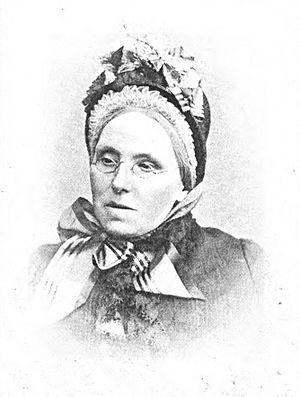Isabella Banks facts for kids
Quick facts for kids
Isabella Banks
|
|
|---|---|

Banks, c. 1888
|
|
| Born | Isabella Varley 25 March 1821 Manchester, Lancashire, England |
| Died | 4 May 1897 (aged 76) Dalston, London, England |
| Resting place | Abney Park Cemetery, Stoke Newington, London, England |
| Occupation |
|
| Nationality | British |
| Period | Victorian |
| Notable works | The Manchester Man |
| Spouse |
George Linnaeus Banks
(m. 1846; died 1881) |
Isabella Banks was an English writer who lived a long time ago, from 1821 to 1897. She was also known as Mrs. G. Linnaeus Banks. Isabella was born in Manchester, England. She is best known for her famous book, The Manchester Man, which came out in 1876.
Contents
Early Life and Interests
Isabella Varley was born on March 25, 1821. Her family lived above her father's pharmacy in Oldham Street in Manchester. From a young age, Isabella was very interested in the history of Manchester. She also loved learning about how the city's government grew.
Her parents, James and Amelia, were active in politics. Her father held important jobs in the city. He was an alderman (a senior member of a city council) and a magistrate (a judge for minor cases).
Isabella also loved to write. Her talent was first noticed when a newspaper, The Manchester Guardian, printed her poem "A Dying Girl to her Mother" in 1837. Her first collection of poems, called Ivy Leaves, was published in 1844.
Writing Career and Family
In 1846, Isabella married George Linnaeus Banks. After they married, she mostly published her books and poems using the name Mrs. G. Linnaeus Banks. Sometimes, she still used her maiden name, Isabella Varley.
Isabella and George had eight children, but only three of them lived to be adults. Her husband, George, was a journalist and editor. He worked in many different places across the United Kingdom.
In the early 1860s, Isabella's oldest child passed away at age 14. This sad event is thought to have inspired her first novel. It was called God's Providence House: The famous story of old Chester. This book was an exciting tale of love and adventure. It was set in the time of highwaymen and the plague around the city of Chester.
Isabella also worked with her husband on some books. In 1865, they wrote Daisies in the Grass: a collection of songs and poems together. They also wrote The Making of William Edwards or The Story of the Bridge of Beauty.
Isabella wrote many other books by herself. Some of her works include:
- The Watchmaker's Daughter and Other Tales
- Forbidden to Marry
- More than Coronets (1881)
- Caleb Booth's Clerk: A Lancashire Story (1878)
- Glory: A Wiltshire Story
- Sybilla and other Stories (1885)
- Miss Pringle's Pearls
- Bond Slaves – the story of struggle (1893)
Bond Slaves was a social novel. This means it was a story about important social problems. It was about the Luddites in the North of England. The Luddites were groups of workers who destroyed machines because they feared losing their jobs. Many of Isabella's books were printed again and again over the years. Some are even sold today!
The Manchester Man
Isabella Banks's most famous novel is The Manchester Man. It first appeared in a magazine called Cassell's Magazine from January to November 1874. Then, it was published as a three-volume book in 1876.
This book became her greatest success. It is seen as an important story about history and society. The novel follows the life of Jabez Clegg, who is the "Manchester Man" in the title. His story begins during the Napoleonic Wars and goes up to the first Reform Act. This act changed how people could vote in Britain.
Jabez's life is full of romance and drama. He goes from being a poor apprentice to a wealthy master. His journey shows how the city of Manchester itself grew and became rich. The book also includes real historical events. It describes the Peterloo Massacre of 1819. This was when soldiers attacked a peaceful protest in Manchester. It also talks about the Corn-Law riots. These protests were against laws that made bread expensive.
In 1896, a year before Isabella died, a special edition of The Manchester Man was published. It had many pictures and maps. Even today, people around the world still read this book. Two characters from the novel, Jabez Clegg and Joshua Brooks, are remembered in the names of pubs in Manchester.
A famous quote from the book is written on the tombstone of Tony Wilson. He was one of the founders of Factory Records in Manchester. The quote is: 'Mutability is the epitaph of worlds / Change alone is changeless / People drop out of the history of a life as of a land though their work or their influence remains'.
A famous writer named Anthony Trollope really admired Isabella Banks's writing. He felt that she had not received enough recognition for her work. A charity that Trollope was involved with, the Royal Literary Fund, later gave Isabella £355 to help her.
Political Interests
Isabella Banks was also involved in fighting for women's rights. She gave talks on topics like "Woman, as She was, as She is, and as She may Be." From 1842, she was a member of the Ladies Committee of the Anti-Corn Law League. This group worked to end the Corn Laws, which made food expensive for poor people.
Death and Legacy
Isabella Banks passed away on May 4, 1897, at her home in London. She was buried next to her husband, George, at Abney Park Cemetery in Stoke Newington, London. George had died in 1881.
In 2015, Isabella was honored in Manchester. A street in the city's First Street development was named after her.
 | Precious Adams |
 | Lauren Anderson |
 | Janet Collins |

